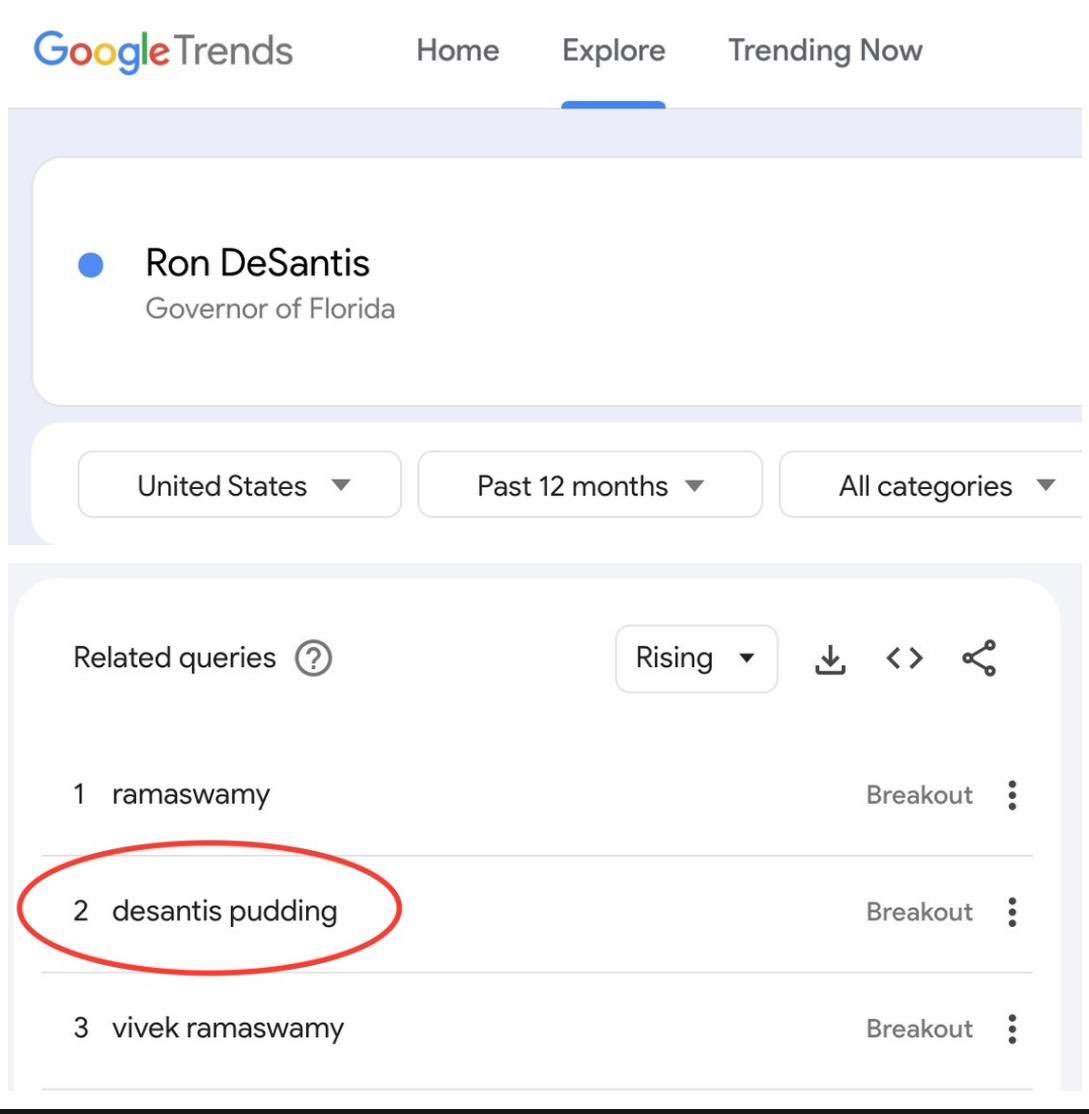We need your help! Join our growing army and click here to subscribe to ad-free Revolver. Or give a one-time or recurring donation during this critical time.
Let’s face it: Ron DeSantis never stood a chance for 2024. When he looks back, he’ll probably agree that jumping into the race was one of the most bewildering political moves ever made. DeSantis let NeverTrump establishment figures whisper in his ear and inflate his ego, convincing him that he could take down the most popular political movement America has ever witnessed. They probably assured him that Trump would be entangled in legal troubles and that the MAGA crowd would need a “savior.” But that just shows a lack of understanding of the Trump movement.
MAGA supporters don’t abandon their leader in tough times; they double and triple down. Anyone who truly “gets” the MAGA universe could’ve told them that. Unfortunately, DeSantis threw away his political future, catering to the desperate whims of the anti-Trump GOP, and now he’s sitting at an embarrassing 8% in the polls, likely pondering where it all went wrong.
NATIONAL POLL
2024 GOP Primary
Trump 59%
Haley 8%
DeSantis 8%
Christie 4%
Pence 3%
Ramaswamy 3%
Scott 1%
Burgum 1%
Hutchinson 1%
Johnson 1%
Elder 1%10/16-17, 2023 | 1,578 RV | MOE +/- 2.4%https://t.co/Z3h0hCouZu
— Election Wizard (@ElectionWiz) October 20, 2023
And where did it go wrong? Well, aside from his inherent disadvantage, DeSantis’s major failing was his online strategy. He aimed to be the “social media candidate,” enhancing Trump’s “Twitter formula” with high-profile online influencers and a meme army that would leave MAGA forces in awe.
However, none of that panned out.
Instead, DeSantis turned into the punchline of the internet’s most viral jokes.
The trouble began immediately. When Mr. DeSantis rolled out his campaign in a live chat on Twitter, the servers crashed, booting hundreds of thousands of people off the feed and drawing widespread ridicule.
When his campaign manager at the time, Generra Peck, discussed the fiasco at a meeting the next morning, she claimed the launch was so popular it broke the internet, according to three attendees, former aides who insisted on anonymity for fear of reprisal for discussing internal operations.
Each recalled being flabbergasted at the apparent disconnect: Senior staff members seemed convinced that an embarrassing disaster had somehow been a victory.
And then “Pudding Fingers” hit and broke the internet:
[…] in March, pro-Trump influencers peppered the internet with posts that amplified a rumor that Mr. DeSantis had once eaten chocolate pudding with his fingers.
The governor’s campaign dismissed it as “liberal” gossip, even as supporters of Mr. Trump began chanting “pudding fingers” at campaign stops and a pro-Trump super PAC ran a television ad that used images of a hand scooping up chocolate pudding. Seven months later, #puddingfingers still circulates on social media.
The episode looks like little more than childish bullying, but such moments can affect how a candidate is perceived, said Joan Donovan, a researcher at Boston University who studies disinformation and wrote a book on the role of memes in politics.
The best — and perhaps only — way to counter that kind of thing is to lean into it with humor, Ms. Donovan said. “This is called meme magic: The irony is the more you try to stomp it out, the more it becomes a problem,” she said.
And that was just the beginning of a relentless meme onslaught from Trump supporters:
The DeSantis campaign’s muted response signaled open season: Since then, the campaign has failed to snuff out memes mocking the governor for supposedly wiping snot on constituents, having an off-putting laugh and wearing lifts in his cowboy boots.
Some of these memes took on a life of their own.
"Hi IOWA… I'm @RonDeSantis. Me and my wife @CaseyDeSantis constantly tell everyone we were 💉 covid heroes, yet currently I myself am a booger "super spreader" Vote #DeSantis 🤣 🌽 pic.twitter.com/J8xJUzOp30
— miguelifornia (@miguelifornia) October 14, 2023
Things took a further nosedive when Team DeSantis decided to create its own “viral videos.”
Attempts to go on the offensive proved even further off the mark. In June, the war room began creating highly stylized videos stuffed with internet jokes and offensive images that seemed crafted for a very young, very far-right audience.
One video included fake images of Mr. Trump hugging and kissing Anthony S. Fauci — a dig at the former president’s pandemic response. Many conservatives were offended, calling the post dishonest and underhanded.
“I was 55/45 for Trump/DeSantis,” Tim Pool, whose podcast has three million subscribers across multiple YouTube channels, wrote in response to the video. “Now I’m 0% for DeSantis.”
Another video cast Mr. Trump as too supportive of L.G.B.T.Q. rights and mashed up images of transgender people, pictures of Mr. DeSantis with pink lightning bolts shooting out of his eyes and clips from the film “American Psycho.”
That was followed by a video that included a symbol associated with Nazis called a Sonnenrad, with Mr. DeSantis’s face superimposed over it.
Aside from the meme and video problem, Team DeSantis was quickly learning that its so-called “influencer army” was out of its league, particularly after a string of blunders that included relentlessly attacking Trump supporters—the very group DeSantis was eager to win over.
Many “DeSantis influencers” devoted their time to attacking Trump supporters and regurgitating the talking points that DeSantis distributed word for word, rather than putting them into their own words. This only intensified the mockery and distrust. The New York Times piece continues:
Benny Johnson, a former journalist with nearly two million followers on X, Twitter’s new name, resisted overtures from the DeSantis team, remaining a vocal Trump supporter. Chaya Raichik, whose Libs of TikTok account has 2.6 million followers, was at the Tallahassee dinner, according to two attendees, but has remained neutral.
Neither Mr. Johnson nor Ms. Raichik responded to requests for comment. Other influencers said they were repelled by the combative, juvenile tenor of the campaign and unwilling to abandon Mr. Trump, who seemed to be only gaining momentum with each passing week.
“It feels like the campaign has been reduced to little more than bickering with the Trump camp,” said Mike Davis, a conservative lawyer with a large social media following. He said the campaign had reached out to him about being a surrogate, but he declined and has since been turned off by its aggressive tactics online.
One influencer, Bill Mitchell, certainly didn’t do the DeSantis campaign any favors by echoing the “daily emails,” a move that others curiously mirrored. This led many to suspect that DeSantis’ online efforts were just a case of copy-and-paste astroturfing.
The existing network of DeSantis influencers has presented challenges for the campaign. Online surrogates for Mr. DeSantis have repeatedly parroted, word for word, the talking points emailed to them each day by the campaign, undermining the effort to project an image of widespread — and organic — support.
Last month, for example, three different accounts almost simultaneously posted about Mr. Trump getting booed at a college football game in Iowa. Bill Mitchell, a DeSantis supporter with a large following on X, said the identical posts were coincidental.
“I talk with all of the team members when necessary but other than the daily emails get no specific direction,” he said.
Team DeSantis also struggled with generating its own viral memes. They either fell totally flat or went viral for being awful. Memes are born from organic excitement and spontaneity; they can’t be forced or scheduled. Team DeSantis tried to industrialize the process with its “war room,” thinking they could manufacture viral memes on a conveyor belt. But memeing is an art form requiring passion and divine inspiration, Renaissance-style. To truly succeed, the memes need the backing of an authentic grassroots movement, something DeSantis never had. The New York Times piece goes on:
Ms. Peck exercised little oversight of the campaign’s online operations, which were anchored by a team known internally as the “war room,” according to the three former aides. The team consisted of high-energy, young staffers — many just out of college — who spent their days scanning the internet for noteworthy story lines, composing posts and dreaming up memes and videos they hoped would go viral.
At the helm was Christina Pushaw, Mr. DeSantis’s rapid response director. Ms. Pushaw has become well known for her extremely online approach to communications, including a scorched-earth strategy when it comes to critics and the press.
In fact, the online antics were so disastrous that DeSantis ended up losing his biggest donor.
The online controversy roiled the rest of the campaign. In early August, the aerospace tycoon Robert Bigelow, who had been by far the largest contributor to Never Back Down, the pro-DeSantis super PAC, said he would halt donations, saying “extremism isn’t going to get you elected.” Money from many other key supporters of Mr. DeSantis has also dried up, including from the billionaire hedge fund manager Kenneth Griffin.
Terry Sullivan, a Republican political consultant who was Senator Marco Rubio’s presidential campaign manager in 2016, said the bizarre videos amounted to a warning sign for donors that Mr. DeSantis’s campaign was chaotic, undisciplined and chasing fringe voters.
“Most high-dollar donors are businesspeople,” Mr. Sullivan said. “Nobody wants to buy a burning house.”
No doubt about it, the DeSantis campaign is a five-alarm fire right now. The only way to extinguish the blaze is for Ron to bow out and throw his full support behind President Trump. But the clock is ticking on that option, and it’s puzzling why he hasn’t reversed course on his string of poor decisions by making the clear best move for his political survival.
SUPPORT REVOLVER — DONATE — SUBSCRIBE — NEWSFEED — GAB — GETTR — TRUTH SOCIAL — TWITTER



Join the Discussion